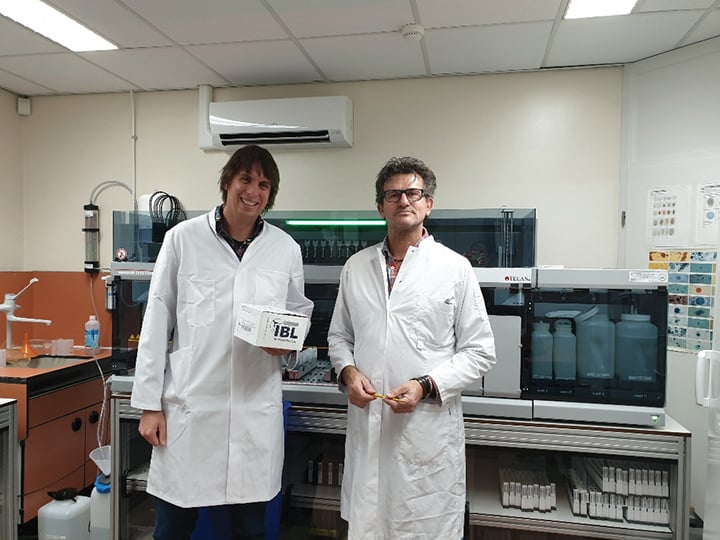Keywords:
Keywords:
Tecan uses cookies to improve our website. By continuing to browse our website, you accept our cookie policy.

Keywords:
Patients suffering from a number of different chronic diseases are turning to holistic healthcare provider RP Sanitas Humanus in the Netherlands for answers, frequently after conventional medicine has been unsuccessful. Food intolerances often lie at the root of the problem, and can be evaluated using automated analysis of IgG and IgG4 antibodies to isolate the true causes.
The name RP Sanitas Humanus, derived from Latin, means to ‘improve health with natural interventions’, a description that perfectly sums up the activities of this Kamperland-based company. The company was established two decades ago to provide holistic healthcare services, and comprises a diagnostic laboratory, RP Analytic, complemented by RP Supplements, which supplies nutritional supplements to naturopath professionals, and educational services delivered through the RP Academy. The laboratory offers a range of analytical services – including fecal analysis and food intolerance testing – to doctors and recognized therapists, to help them make a more informed diagnosis in patients suffering from chronic diseases. Ralf Abels, CEO and co-founder of RP Sanitas Humanus, explained: “The majority of our work is focused on chronically ill patients suffering from a broad spectrum of conditions – for example, chronic bowel disease, rheumatic patients and behavioral disorders – where conventional medical approaches have been exhausted to no avail.”

IgG and IgG4 Food Screen ELISAs and Freedom EVOlyzer workstations are helping RP Sanitas Humanus take a targeted approach to food intolerance testing
Ralf continued: “The crucial thing for these patients is to identify the trigger that is causing their health problem. We take a holistic approach to diagnosis, looking at the big picture and not just isolated symptoms. To begin with, we look at the patient’s general condition – the gut microbiota, inflammatory state, immune system and potential pathogens – and run blood tests to check liver and kidney function. These results help direct any further diagnostic tests that may be necessary, such as screening for food intolerances, which are surprisingly often a contributory factor in chronic conditions. The involvement of IgG and IgG4 antibodies is well known, and testing for these gives us more specific insight into the cause of the patient’s problem, taking the guesswork out of advising which foods they need to avoid consuming. Instead of simply suggesting they try eliminating a particular foodstuff and see what happens, we can identify the specific cause of the patient’s reaction.”
RP Sanitas Humanus receives in the region of 100,000 samples a year for food intolerance testing, many of which will undergo more than one level of screening. Previously, these samples were sent to another laboratory for testing but then, two years ago, the company brought the service in house, running Tecan’s IgG and IgG4 Food Screen ELISAs on two Freedom EVOlyzer® workstations. “When we decided to bring this testing in house, the biggest consideration was to find a company offering assays that would allow us to screen in a structured way; we wanted to be able to run a preliminary screen that would direct further in-depth testing if necessary. This keeps costs to a minimum for our patients – they don’t end up paying for unnecessary tests. Tecan was the only supplier that could provide us with a complete automation solution tailored to our needs, allowing us to take a targeted approach,” said Ralf.
“Initially, we run a base panel of seven core allergens from the most common food groups – fruits, vegetables, fish, meat – which gives us an indication of total IgG (types IgG1-4) and also IgG4, which is indicative of more severe reactions. Based on these results, we then go on to run a more specialized follow-up screen of a further 24 allergens tailored to the individual patient. For example, if the patient follows a vegetarian diet, there will be more focus on fruit and vegetables, while animal products will not be included in the screen. In all, we can test 280 foods from 16 product groups, which gives us a very good chance of identifying the specific food the patient cannot tolerate and should eliminate from their diet.”

“The implementation of a complete automated food intolerance testing solution has really benefitted the laboratory. The combination of Tecan’s IgG and IgG4 Food Screen ELISAs and the Freedom EVOlyzer workstations has given us the throughput we need and made the entire workflow less labor intensive. All the modules we need to process the assays are integrated onto the Freedom EVOlyzers, which are linked to our LIMS. We simply set up a worklist, press start and leave the system to run overnight. The results are transferred directly to the LIMS and all we need to do is review them in the morning and send the report to the referring practitioner.”
“Testing for food intolerance is just the start; once we have determined the cause of the problem and made dietary recommendations, success lies in the hands of the patient. Recovery can take months but, when the patient is motivated and prepared to act on the results of the test, adjusting their diet accordingly, we have seen success rates of between 70 and 80 percent for some chronic diseases. The challenge for the patient is to continue to follow the recommendations months down the line, even when they feel as if they have recovered,” Ralf concluded.
Tecan was the only supplier that could provide us with a complete automation solution tailored to our needs, allowing us to take a targeted approach.
To find out more about food intolerance testing, visit www.food-intolerance-diagnostics.com To learn more about RP Sanitas Humanus, go to www.rpsanitashumanus.com
Keywords: